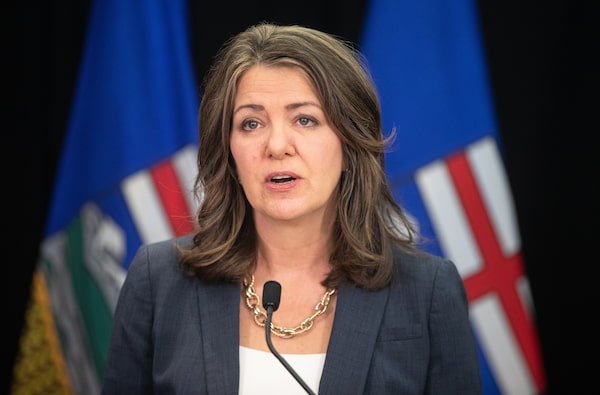
Alberta Premier Danielle Smith in Edmonton on April 10.JASON FRANSON/The Canadian Press
Lynora Saxinger is an infectious-diseases specialist, physician and professor of medicine at the University of Alberta. Braden Manns is a physician and professor of medicine and health economics at the University of Calgary. He was an interim vice-president for Alberta Health Services until he resigned on June 11, 2023. Dr. Manns and Dr. Saxinger were co-chairs of the Alberta Health Services COVID-19 scientific advisory group from March, 2020, to December, 2022.
COVID-19 was a massive, deadly public-health emergency that hospitalized hundreds of thousands of Canadians and killed more than 59,000. The pandemic, with its public-health measures, stole life experiences from our children, caused economic hardship, and it increased social isolation, substance use and mental-health disorders. It stretched health care workers and systems to the breaking point, and left an ever-widening chasm within society.
As physicians and co-chairs of Alberta Health Services’ former COVID-19 scientific advisory group, we saw the quickly evolving knowledge lead to very different takes on what was happening. For many, strongly-held beliefs and misinformation proved more compelling than the evolving scientific understanding. Society splintered into groups around issues such as public-health measures, vaccines, mandates, treatments and masking.
After such a major event, an “after-action report” to improve future responses is a public-health expectation. The World Health Organization guidance for these reviews recommends including input from diverse groups involved at various levels, and some countries have been working through this already.
In Canada, there has been some analysis in academic papers and narrow provincial reviews (for example on long-term care), and in 2021, Canada’s auditor general released a report on the country’s initial pandemic preparedness. The Centre of Excellence on the Canadian Federation recently released a report calling for a pan-Canadian review of pandemic responses.
But so far, there has been no federal or provincial review of the biggest elephant in the room: the overall effects of public-health measures, a critical piece in pandemic-proofing society.
That is, until Alberta’s secretive COVID-19 pandemic response task force. As reported by The Globe and Mail, the mandate from Alberta Premier Danielle Smith was to review how data and health information were used. This task force seems a companion piece to the controversial Manning Report, which examined Alberta’s legal framework in the pandemic.
The report isn’t out, but it doesn’t seem likely to meet any of the usual goals of an after-action report.
The chair is Gary Davidson, a physician and former United Conservative Party candidate who contributed to the National Citizens Inquiry, a group whose final report reads as a conspiracy-ridden summary of fringe beliefs. The authors condemn any public-health mandates, and say that “relentless” vaccination and denial of the disproven treatment ivermectin constitute malpractice.
Dr. Davidson is on record saying that public-health measures were issued when waves of COVID were already receding to make them appear effective. The rest of the province’s task force has either resigned, or has publicly supported similar views as Dr. Davidson.
This provides no confidence in the likelihood of an unbiased, inclusive and transparent review. A concerning precedent of preformed conclusions was set by the Manning Report, which had recommendations that largely echo a publication written before the work was started.
We are concerned this current task force will also produce a predictable set of conclusions at odds with those of public health and health systems experts.
Everyone wants to move on from the pandemic. It was a traumatic experience, and talking about it doesn’t win votes these days, except potentially for Ms. Smith, who still uses public-health measures and vaccinations as talking points with her core supporters.
But going forward, we face a fork in the road. On one path, evidence-based rationalists review data and experience, analyze, update and plan. On the other, experts using evidence are the enemy, and beliefs outweigh unbiased information in decision-making.
Recognizing we are likely to experience another pandemic within our lifetimes, if we want to do better, we shouldn’t fall for one-sided narratives. We need to collectively look at all of the effects of pandemic measures with a clear eye.
We support a comprehensive review of governments’ pandemic responses, including public-health measures. This should include the lived experience of a range of people, be grounded in good data and the best possible evidence, and explicitly balance competing priorities.
Some public-health and infection control measures were more effective, and some had more negative consequences. Restricting access to parks wasn’t helpful and reduced confidence in other measures. Recommending universal (rather than risk-based) N95 masking, when the evidence was equivocal, and vaccine mandates created more societal divisions. COVID-19 vaccines were a triumph of good science, but were underused and undermined by disinformation. Even COVID publications are polarized, and expertise is needed to weigh the quality of the science fairly.
Canadians deserve to have the experience gained in this pandemic used to make better future decisions. It seems clear that the Alberta task force will not contribute to the broad unbiased review that is needed.
The question is – will the provinces and the federal government bring together all the groups and conduct an independent, comprehensive review? Government collaboration currently feels like wishful thinking, but it’s the leadership we need from elected officials.